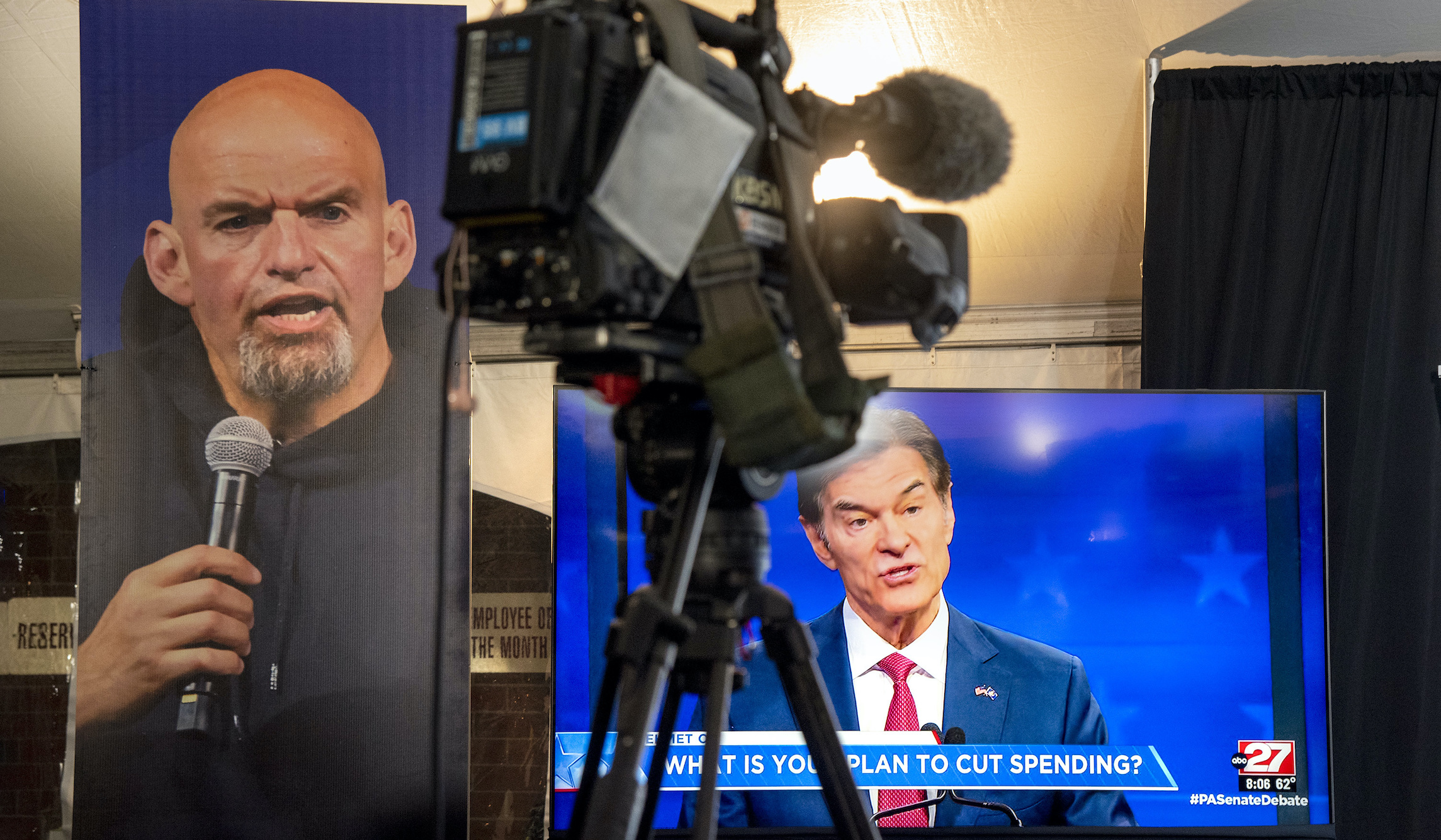John Fetterman’s struggles in Pennsylvania’s only Senate debate on Tuesday have raised hopes within Republican ranks of a victory in one of the most important races in the country.
But while Republicans were seemingly granted a political gift on Tuesday night, Democrats could be thanking their lucky stars that ballots have already been cast thanks to early voting in this midterm cycle.
A question that had hung over the Senate race for weeks — whether the Democratic candidate is capable of deliberating and speaking on the Senate floor — was seemingly answered Tuesday on the debate stage.
MIDTERMS 2022 LIVE: UPDATES FROM THE CAMPAIGN TRAIL AHEAD OF CRUCIAL ELECTION
But Pennsylvania voters have had weeks to cast their ballots by mail, and hundreds of thousands of residents have already availed themselves of the opportunity to vote before Election Day.
That means any bounce Republican Mehmet Oz receives from his strength in the debate could be dampened.
“I think this is certainly a huge argument why early voting needs to be weighed against the debate schedule,” Matt Gorman, Republican strategist and former spokesman for the National Republican Congressional Committee, told the Washington Examiner. “I like to believe that people were waiting to see this debate, but you never know.”

Both campaigns agreed to the Oct. 25 date after Fetterman avoided scheduling a face-off with Oz for weeks, until political pressure forced his campaign to lock down a day.
As of Wednesday, 686,123 voters had submitted ballots early. In 2018, the last midterm cycle, just over 5 million people voted on or before Election Day in the Senate match between Democratic Sen. Bob Casey and Republican Lou Barletta.
Berwood Yost, director of the Center for Opinion Research and the Floyd Institute for Public Policy at Franklin and Marshall College, said polls showed static levels of support for both candidates before the lone debate of the race.
“I think the way I would characterize the Senate race is that Fetterman had a relatively comfortable lead through the summer, and then the race tightened as a result of Mr. Oz getting more heavily on television and doing more campaigning,” Yost told the Washington Examiner. “The race got to be [within] a few points, and I think that’s where it stabilized.”
Fetterman’s recovery from a stroke he suffered just days before the Democratic primary limited his ability to campaign for months. Emerging from the light schedule he kept over the summer into the thick of the fall campaign season has exposed significant vulnerabilities for the candidate.
Democrats’ last chance to make alternative arrangements on the ballot passed them by on Aug. 15, after which they committed to him as their nominee in the Senate race.
Prior to that deadline, however, Fetterman’s health had factored relatively little in the race. He had done few interviews or traditional campaign events, and his allies were still insisting around that time that he suffered minimal lingering effects from the stroke.
Even Fetterman’s own team acknowledged, both before and after the debate, that the format of the event presented their candidate with problems.
“If you’re Fetterman, you have to hope that voters in PA did not watch,” Ari Fleischer, former White House press secretary for President George W. Bush, told the Washington Examiner. “Outside of partisans, it’s hard to imagine anyone who watched who won’t think Fetterman is not well.”
Beyond his verbal and auditory struggles, Fetterman also stumbled over some of his basic policy positions, misstating his abortion stance and obfuscating his opposition to fracking.
Fetterman’s campaign website says the candidate supports a piece of legislation that legalizes late-term abortions, although he said during the debate that he supports codifying the Roe v. Wade standard, which generally allowed for restrictions on abortion after the point at which a fetus could survive outside the mother.
Oz, for his part, made an even bigger and more concise stumble on the topic of abortion during the debate.
While attempting to explain his position that Congress should not weigh in on abortion questions that he said state lawmakers should answer, Oz quipped that “women, doctors, [and] local political leaders” should make abortion decisions.
Democrats quickly seized on the line.
Tracy Sefl, a Democratic strategist, said voters are likely to see through an admittedly poor debate performance from Fetterman to his stances on issues like abortion.
“Fetterman is in recovery from a major stroke, of course; sympathetic viewers saw and heard what that means in real-time, magnified by the debate’s rapidly timed format,” Sefl told the Washington Examiner. “It was uncomfortable to witness and voters will no doubt be bombarded with post-debate analysis overly focused on his performance onstage.
“What I keep in mind is what voters want the most: it’s not the process or performance story, it’s how their elected leaders will approach the issues most important to them.”
Polls show the Senate race tightening in the final days of the campaign.
Fetterman maintains a 2.3 percentage point lead in the weighted average of polls from data website FiveThirtyEight, but Oz has trended upward in the most recent surveys while Fetterman’s support has remained relatively even.
Yost said any momentum Oz gains as a result of his debate performance won’t register in polls for several days.
While debates traditionally do little to move voters in either direction, the Pennsylvania Senate one raised fresh fears about Fetterman that the Democratic candidate has little time to address.
CLICK HERE TO READ MORE FROM THE WASHINGTON EXAMINER
His strained performance this week could depress Democratic voter turnout enough to tip the outcome, Gorman said.
“Oz had the momentum, if you talk to folks who are close to that race, anyway – before this,” Gorman said. “I think this seals it.”
